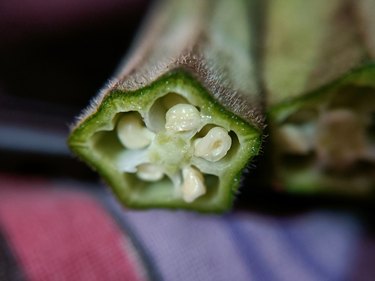
Grown for its immature seed pods, okra (Abelmoschus esculentus) is a warm-weather vegetable native to Africa and Asia that features prominently in the cuisine of the American South, where it is used to make the region's signature gumbo. You can grow okra from seed in the home garden. Because of their hard seed coat, you should soak okra seeds before planting in order to help them germinate.
Soaking Okra Seeds
Video of the Day
Okra seeds have a hard seed coat that can impede proper germination. As a result, the seeds need to be scarified and soaked prior to planting. To scarify the seeds, simply rub them with sandpaper. You should then soak the seeds for 12 to 24 hours prior to planting. You can do this by wrapping the seeds in a wet paper towel. With this method, okra germination time is approximately a week.
Video of the Day
Okra Planting and Care
As a tropical plant, okra grows best when air temperatures are between 75 and 90 degrees Fahrenheit. Seeds should be planted two to three weeks after the last frost of the spring once soil temperatures have reached 65 degrees. If you plant okra seeds in soil that is too cold, they may not germinate. In cold conditions, young seedlings may die. You can also start the seeds indoors one or two weeks before the last frost and transplant them into the garden once the soil warms up.
Okra plants produce flowers that resemble those of hibiscus plants. For the best flowering, plant okra in a spot that receives full sun, which means at least six hours of direct sunlight a day. This also helps produce the best possible crop. Okra should be watered to a depth of about 6 inches to help the plants develop a strong, deep root system.
Okra can be harvested once the seed pods are between 2 and 4 inches in length. The length of time between germination and harvest is usually about 55 days. Avoid leaving the pods on the plant for too long, as they will become tough and unpalatable.
Tips for Growing Okra
You can harvest seeds from your okra plantings to use the following season. Seeds are also available for purchase. Before purchasing okra seeds, however, you should take the time to look for the expiration date on the packaging. If the seeds are close to expiring, they may not germinate even with soaking.
Okra plants are capable of growing in many different types of soil. However, they will perform best in sandy loams that have been amended with organic matter. The soil should have a pH between 5.8 and 6.5, so it's a good idea to have your soil tested prior to planting. Avoid planting okra in soil where tomatoes, squash or potatoes have previously grown, as these vegetable plants are susceptible to pests known as root nematodes that can linger in the soil and affect okra.
When growing okra, it is important to keep weeds in check with cultivating and by using mulch made of organic materials. This is especially important when the plants are becoming established.